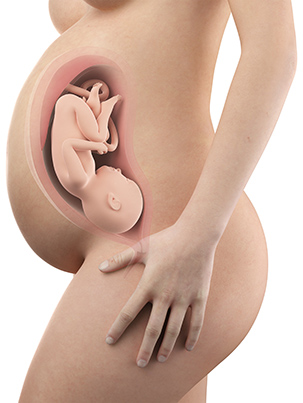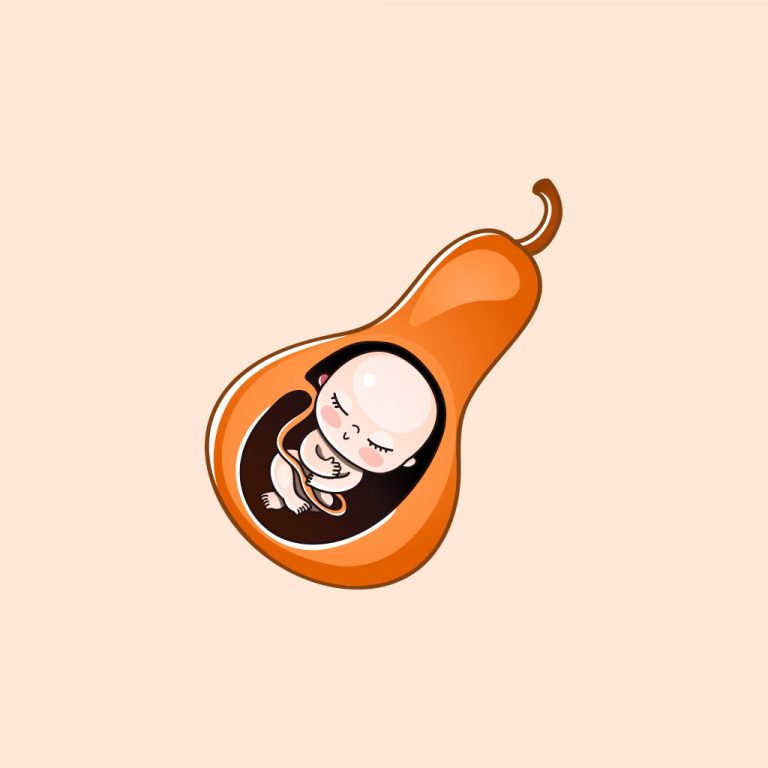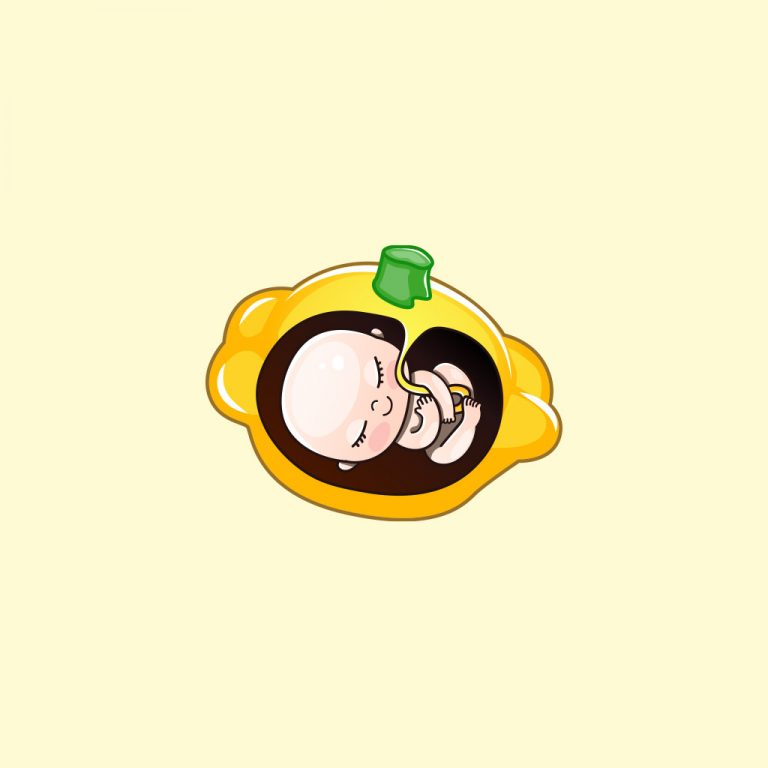You’ve made it to week 36—what an incredible milestone! Just four weeks (or maybe even less) until you get to meet your new baby. At this point, your body and your baby are making important final preparations for birth. You might be feeling a mix of excitement, nervousness, and even impatience—and all of that is completely normal.
Right now, your baby is about the size of a large head of romaine lettuce, measuring close to 18–19 inches long and weighing about 6 pounds. Most babies are getting ready to settle into the head-down position for birth. You might notice more pressure in your pelvis, and it’s totally normal if walking or moving around feels a bit different or more awkward.

Your body is still busy behind the scenes, even though it might feel like you are just waiting now. You could be experiencing more Braxton Hicks contractions—these “practice” contractions can be stronger and more noticeable now, but if they become regular or painful, it’s a good idea to check in with your provider.
At this stage, you might also notice your baby “dropping” lower into your pelvis. This process, called lightening, can mean two things: breathing may feel easier, but trips to the bathroom might become even more frequent. If you’ve felt breathless earlier in pregnancy, you may finally catch a break!
Week 36 is also the time when your doctor might start seeing you weekly, rather than every two weeks. These appointments are an opportunity to ask questions and share anything that’s on your mind, no matter how small it may seem. It’s perfectly understandable to feel both anticipation and a little worry as you wonder when labor will start or what it will feel like. Remember, your care team is there for you every step of the way.
Many moms-to-be use this time to finish packing their hospital bag, review their birth plan (if they have one), and double-check that everything at home is ready for baby’s arrival. Make sure you’re getting enough rest and also carving out some time to relax. You’re almost there—trust your body, and let yourself soak in these final weeks of your pregnancy journey.
Your Baby’s Development This Week
At 36 weeks pregnant, your little one is almost ready to meet you! In these last few weeks before delivery, your baby is putting the final touches on growth and development. This is an exciting time, as your baby is getting stronger and preparing for life on the outside. Let’s take a closer look at what’s happening with your baby right now.
By this week, your baby is about the size of a bunch of kale or a head of romaine lettuce. On average, your baby measures between 17½ and 19 inches from head to heel and typically weighs between 5¾ and 6¾ pounds. While every baby is unique, it’s amazing to think how much growing has happened over the past nine months!
- Smoother, Plumper Skin: Layers of fat keep forming underneath your baby’s skin, giving them a much less wrinkled and more rounded appearance. This extra fat helps your baby regulate their temperature after birth — a crucial skill for newborns.
- Flexible, Soft Bones: Your baby’s skeletal system is mostly formed, but their bones, especially those in the skull, aren’t tightly fused yet. This softness allows the head to gently reshape during delivery, making labor a bit easier for both you and your baby.
- Lung and Organ Readiness: Most babies’ lungs are mature enough to work on their own by this week, although every day spent in the womb adds a little more strength. Your baby’s kidneys and liver are also fully functioning now, ready to process waste after birth.
- A Growing Brain: The brain continues to develop at a lightning pace. Your baby’s nervous system is becoming more complex, allowing all those kicks and stretches you feel. Even sleep patterns are forming; your baby is now able to blink and may even respond to light or familiar sounds.
- Sucking and Feeding Practice: The sucking reflex is now fully developed, so your baby spends some time practicing this skill — even sucking a thumb or fingers! This reflex will help with breastfeeding or bottle-feeding once your little one arrives.
- Fine Details: Your baby’s fingernails have now grown to the tips of their fingers, and you might even notice these at birth. Eyebrows and eyelashes are also more visible, making them look even more like the baby you’ll soon meet.
During this stage, your baby’s movements may feel a little different — rather than sharp kicks or jabs, you might notice more stretching, rolling, or shifting. That’s because space is getting tight in the womb, but your baby is still very active and responding to sounds, voices, and gentle touches.
Even though your baby could technically be born now and do well, every extra day in your belly helps with gaining weight and finishing up those last bits of development. Hang in there — you’re both doing an amazing job! These final weeks truly set the stage for a healthy and happy meeting between you and your little bundle of joy.
Changes in the Mother’s Body
As you enter week 36 of pregnancy, you’re probably feeling a mix of excitement and impatience. At this stage, your body is working hard to get everything ready for your baby’s arrival, and you might notice some new changes — both big and small. Knowing what to expect can help you feel more comfortable and confident as you count down the days until you meet your little one.
One of the noticeable changes right now is how your baby starts to settle deeper into your pelvis, which is often called “lightening.” This can reduce pressure on your chest, making it a bit easier to breathe. At the same time, many women find that this shift puts extra pressure on the lower belly and pelvis, which can bring new aches or feelings of heaviness, especially when you’re walking or standing for a while.
You might also notice more frequent trips to the bathroom. Because your uterus is so much bigger now and your baby is lower down, your bladder has less room than ever before — so don’t be surprised if you need to pee even more often, even during the night.
- Changes in posture: Your center of gravity has shifted, which can affect the way you walk and move. Try to move carefully and use handrails on stairs whenever possible.
- Stretch marks and itchy skin: Your skin may feel itchier as it stretches, especially on your belly, hips, and breast area. Gentle moisturizers can help soothe irritation.
- Leaking colostrum: Yellowish fluid may leak from your nipples as your body begins preparing for breastfeeding. This is perfectly normal and nothing to worry about — it just means your breasts are gearing up for feeding your baby.
- Increased Braxton Hicks contractions: You may notice more frequent “practice” contractions as labor approaches. These usually feel like tightening across your belly, but they typically don’t grow stronger, closer together, or last longer like real labor contractions do.
- Swelling: Mild swelling in your feet, ankles, and hands is common due to your body holding onto more fluid. It often gets worse as the day goes on, so try to rest with your feet up when you can.
- Vaginal discharge: It’s normal to see more discharge than usual now, and it might be thicker or have a slightly different texture. Always call your doctor if the discharge is watery, greenish, or tinged with blood that worries you.
- Restless sleep: It can be tough to find a comfortable sleeping position, and you might wake up often. Pillows between your knees or under your belly can help, and gentle stretches before bed may make it easier to relax.
Your emotions may change quickly too — it’s normal to feel tired one day and energized the next. Many moms-to-be also notice “nesting” instincts kicking in, giving you bursts of motivation to clean or organize.
Be sure to listen to your body, rest when you need to, and ask for help from friends or family. If you notice anything that feels off, like severe headaches, sudden swelling, or any signs of labor, call your healthcare provider right away. Remember, every day your baby stays in the womb at this stage is helping them get ready for a healthy start in the world. You’re almost there, and all these changes mean you’ll be holding your baby soon!
What Medical Checkups and Screenings Happen at Week 36?
You’re in the home stretch, and your medical appointments start to feel more frequent now! At 36 weeks pregnant, your healthcare provider will want to keep an extra close eye on both you and your baby to make sure everything is going smoothly as you prepare for birth. Here’s what you can expect at your checkups this week:
- Weekly Visits Begin: Starting at 36 weeks, most moms will have a checkup every week until delivery. These appointments make sure you and your baby are healthy as you head towards your due date.
- Weight and Blood Pressure Checks: Each visit, your weight and blood pressure are measured. These numbers help spot any changes that might point to things like swelling or high blood pressure—both important to catch early.
- Belly Measurements: Your doctor will measure your “fundal height” (the size of your belly from your pubic bone to the top of your uterus). This helps make sure your baby is growing just right.
- Baby’s Position: Around 36 weeks, your provider will gently press on your belly to feel where your baby is resting. Most babies turn head-down by now for birth, but your provider will check just in case your baby is breech (feet or bottom down) or in another position.
- Cervix Exam: Your doctor may check your cervix to see if it’s starting to soften, thin out, or open—signs that your body is getting ready for labor.
- Listening to Baby: Each visit, you’ll probably get to hear your baby’s heartbeat. This quick check gives lots of reassurance and helps your provider know how your little one is doing.
- Group B Strep (GBS) Test: If you haven’t already, you’ll have a simple swab taken from your vaginal and rectal area. This screens for a common bacteria called Group B Streptococcus. If you test positive, you’ll get antibiotics during labor to protect your baby.
- Discussing Symptoms: Now is the perfect time to ask about any new or troubling symptoms—especially things like feeling less baby movement, severe swelling, headaches, unusual pain, or changes in vision.
- Planning for Labor: Your provider might talk with you about signs of labor, when to call or come to the hospital, and any special preferences or concerns you have for your delivery.
Every checkup at this stage is about making you feel confident, cared-for, and ready for the big day. Your healthcare team is there to support you and answer any questions—no topic is too small, so never hesitate to speak up!
It’s also helpful to write down any questions or worries before your appointment so nothing gets forgotten in the moment. These last weeks are busy, but remember: you’re doing an amazing job caring for yourself and your growing baby!
Nutritional Tips and Physical Exercise
At 36 weeks pregnant, you’re in the home stretch, and what you eat (and how you move) matters just as much as ever. Giving your body the right fuel and gentle activity helps you feel your best, supports your baby’s final growth spurt, and prepares you for labor.
- Focus on Iron and Protein: Your baby is building up iron stores for after birth. Fill your plate with lean meats, beans, spinach, or iron-fortified cereals. Pair iron-rich foods with vitamin C (like a squeeze of lemon or some berries) to help your body absorb it better.
- Stay Hydrated: Your body needs plenty of water for all the extra work it’s doing. Carry a water bottle and aim for small, regular sips throughout your day. If plain water feels boring, try adding a slice of fruit or a splash of juice.
- Eat Small, Frequent Meals: With your baby growing and your stomach more crowded than ever, large meals can bring on heartburn or discomfort. Try eating smaller meals or healthy snacks every few hours—think yogurt with fruit, whole-grain crackers with cheese, or a banana with peanut butter.
- Don’t Forget Calcium: Your baby’s bones are still getting stronger. Choose calcium-rich foods like milk, cheese, leafy greens, or fortified plant milks to support this final phase of bone development.
- Go Easy on Salty Foods: Swelling is common now. Reducing extra salt in your diet can help manage this. Opt for fresh or home-cooked meals when you can, and flavor with herbs instead of added salt.
- Listen to Your Body: Your hunger may come and go, and that’s okay. Some days you’ll eat more, some less. Trust your appetite, rest when you need, and always pay attention to thirst and feelings of fullness.
Physical activity is still important, though your routines might need adjustments. Staying active can ease aches, improve your mood, and help you sleep a little better.
- Gentle Movement: Even a slow walk in your neighborhood or gentle stretches at home can boost circulation. Take your time and stop if you feel lightheaded or uncomfortable.
- Pelvic Floor Exercises: Practicing Kegels helps strengthen muscles you’ll use during labor and recovery. Try to squeeze and hold those muscles for a few seconds at a time, several times a day—you can even do this while watching TV or lying in bed.
- Prenatal Yoga: A short, guided yoga routine can help ease tension in your back and hips. Look for classes or videos designed for late pregnancy, and avoid positions that put too much strain on your belly or require lying flat on your back.
- Stretching for Comfort: Focus on gentle neck, shoulder, and lower back stretches. This can help with aches caused by your changing posture and growing belly.
- Rest When You Need It: If your legs or feet swell after exercise, put them up for a while and relax. It’s perfectly normal to feel tired—don’t push yourself more than is comfortable.
If you have any questions about what’s safe or best for you now, check in with your healthcare provider. Remember, taking good care of yourself is also taking good care of your baby. You’re almost there!
Weekly Checklist
This week, you’re almost at the finish line! Here’s a helpful checklist to make sure you’re feeling prepared, comfortable, and supported as you head into these important final weeks.
- Double-check your hospital bag. Make sure you have everything you need, including comfortable clothes, phone chargers, snacks, toiletries, and any special items for labor or after baby arrives, like a favorite pillow or robe.
- Complete your birth plan (if you’re making one). Review your preferences for pain relief, support people, and baby care, and bring a copy to discuss with your healthcare provider.
- Install your car seat and practice using it. Make sure the seat is properly secured, and take a test run if you’re new to car seats. Many fire stations or hospitals offer free safety checks.
- Wash and organize baby’s clothes, blankets, and bedding. Use a gentle detergent and arrange outfits and swaddles so they’re easy to grab when you need them.
- Prepare healthy meals for after baby’s arrival. Cook and freeze a few simple dinners or stock up on easy-to-prepare foods, so you have nourishing options after the birth.
- Talk to your support team. Let your partner or loved ones know how they can help in the coming weeks—whether it’s meals, rides to appointments, or simply being on call.
- Keep track of baby’s movements. Spend a few minutes each day paying attention to kicks and rolls. If you notice a significant change, notify your doctor.
- Organize important paperwork. Have your insurance cards, ID, and any other documents you’ll need for the hospital in a folder or bag.
- Make a list of people to update when baby arrives. Decide who you’d like to inform first and how you’ll do it—this can help take pressure off you later.
- Treat yourself to a little comfort. Try gentle stretching, warm baths, or soothing music to relax your body and mind as you navigate any aches, sleeplessness, or anxious feelings.
- Check in with your healthcare provider. Make sure you understand when and how to reach out if you experience signs of labor or have questions—no concern is ever too small.
Every small step you take this week brings you closer to meeting your baby! Remember to pause, take deep breaths, and savor the last days of your pregnancy journey—you’re doing wonderfully.
When to Call Your Provider
As you reach Week 36 of pregnancy, it’s normal to notice new aches, changes, or worries. Pay attention to your body, and don’t hesitate to reach out to your healthcare provider if something feels off. Trust your instincts—they matter. Here are some signs that deserve a call or visit to your provider:
- Consistent or painful contractions: If you are having contractions that follow a pattern, become stronger, or get closer together—especially if they come every 5-10 minutes and don’t go away with rest or hydration—contact your provider. This could mean labor is starting.
- Leaking fluid: A sudden rush or a steady trickle of clear, watery fluid from your vagina may mean your water broke. Let your doctor know right away, even if you’re not sure.
- Noticeable decrease in your baby’s movements: If you sense your baby is moving less than usual, or you’re not feeling at least ten movements in two hours, it’s important to call. Your baby’s movements are a sign they are doing well.
- Bright red bleeding: Bleeding like a period or more can be a sign of a problem. Light spotting can be normal, but any heavy bleeding, clots, or a sudden gush needs urgent attention.
- Severe swelling or headaches: While mild swelling is common now, call your doctor if you develop severe or sudden swelling in your face, hands, or feet. Persistent bad headaches, vision changes, or pain in your upper belly can be signs of high blood pressure that need quick care.
- High fever or chills: A fever over 100.4°F (38°C) that doesn’t go away, especially if it comes with chills or body aches, should always be reported—you and your baby need to stay safe from infections.
- Severe stomach pain: Sudden or intense pain in your lower belly or back shouldn’t be ignored, especially if it doesn’t ease with rest.
- Feeling faint or short of breath: Some breathlessness is normal, but if you feel dizzy, like you might pass out, or you’re gasping for air, call your doctor.
- Signs of infection: Burning, pain, or blood when you pee; foul-smelling vaginal discharge; or a sudden spike in discharge should be checked out.
Your doctor and care team would rather answer questions than have you worry at home. No concern is too small, especially as you get closer to meeting your baby. If you’re ever uncertain, trust yourself and reach out—it’s always better to ask.
Preparations for Baby
As you enter week 36, it’s completely normal to feel both excitement and a few last-minute jitters. This is a wonderful time to focus on making your home and heart ready for your baby’s arrival. Small, thoughtful touches can help you feel calmer, more prepared, and even enjoy these final weeks.
- Create a cozy sleeping space: Make sure your baby’s crib or bassinet is set up and safe. Wash and arrange a few soft sheets and blankets so everything is fresh and comfortable. Keeping things simple and clutter-free helps both you and your baby feel at ease.
- Stock up on essentials: Take inventory of newborn diapers, wipes, gentle laundry detergent, and baby care basics. A basket or cart with these items near your sleeping space can be a real lifesaver during late-night changes.
- Plan some easy meals: Consider preparing a few simple meals now and freezing them. Even a couple of soups or casseroles in the freezer will be a big help when you’d rather snuggle with your baby than stand in the kitchen.
- Practice self-care rituals: Make time for calming activities—like reading, warm baths, or gentle stretching. Taking care of your own well-being is a gift to both you and your baby.
- Keep your phone list handy: Write down important contact numbers—like your doctor, pediatrician, and a trusted friend or family member—in an easy-to-find spot. This small step can bring peace of mind if you need support.
- Share chores with your support system: Don’t be shy about accepting help. A partner, friend, or family member can run errands, tidy up, or walk the dog so you can rest when you need to.
- Personal touches for baby: Lay out a special first outfit or soft hat for your newborn, or add a gentle nightlight near where you’ll feed and change your baby. These little details can bring comfort during those early hours together.
- Build your confidence: Spend a little time each day visualizing your first moments with your baby. Remind yourself that it’s okay not to have everything perfect—you’re the perfect parent for your child just by being yourself.
Above all, trust that you’re doing a wonderful job. It’s okay to ask for help, lean on loved ones, and savor the last quiet moments before your baby arrives. This special time is about preparing not just your space, but your heart, for one of life’s most memorable welcomes.
Citations and References
The American College of Obstetricians and Gynecologists (ACOG) – Provides detailed guidance on fetal development, Group B Streptococcus (GBS) testing, and late preterm care. Visit Source
Centers for Disease Control and Prevention (CDC) – Offers information on healthy pregnancy milestones, GBS testing, and warning signs in late pregnancy. Visit Source
Mayo Clinic – Breaks down week-by-week fetal and maternal changes, including symptoms, growth measures, and preparations for labor at 36 weeks. Visit Source
Cleveland Clinic – Explains common symptoms, physical changes, and what to expect at medical appointments during week 36. Visit Source
National Institutes of Health (NIH) – Details late preterm development, organ maturation, and risk factors at this stage. Visit Source
World Health Organization (WHO) – Provides global standards on labor, delivery, and indicators for monitoring maternal and fetal health as pregnancy reaches term. Visit Source









